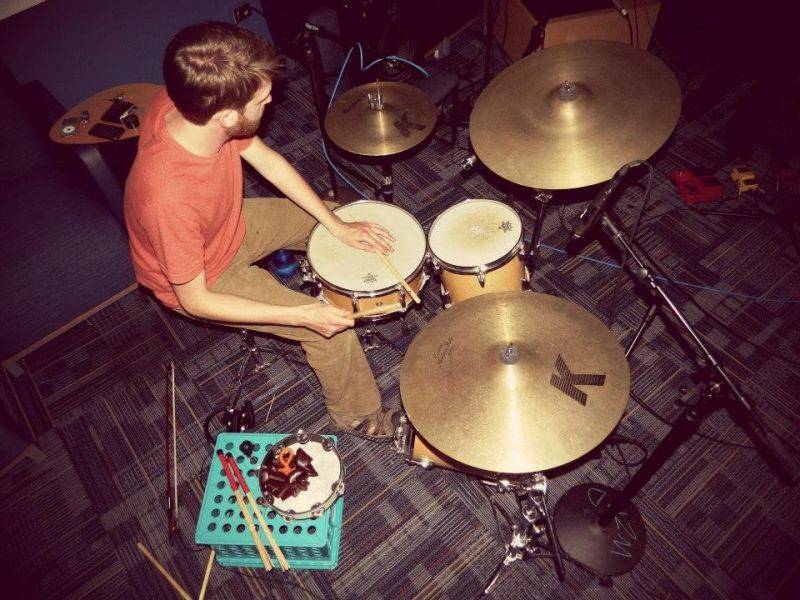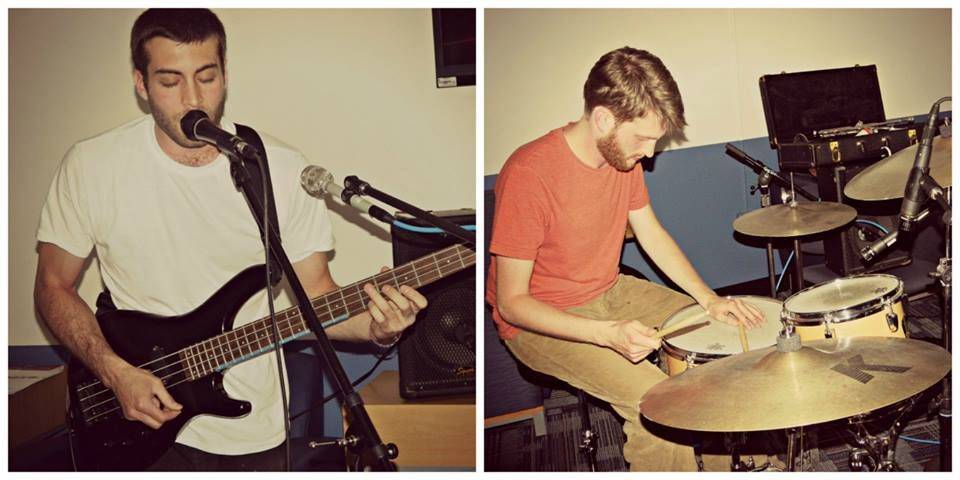As a far as typical uncomfortable experiences go, nothing is more commonplace than the adolescent transition into dormitory life. The lack of privacy and living space, and the mediocre food are the basic staples of communal housing for many Americans who are fortunate enough to have access to higher education. Over the course of a year, roommates may either become the best of friends, the worst of enemies, or in my situation, good yet distant friends. In the fall of 2009 I moved into my first C-U dwelling, a reputably friendly dorm known as Allen Hall, and by completely random chance I had the pleasure of getting to know Danny Wolff. While I’d like to think back of the time as us getting along quite well, we did of course have our fair share of disagreements, both musical and practical.
Then time passed on, as I grew out of my freshman year, and his tolerance of dorm living grew short, and he moved out into a Urbana apartment as I stayed behind for another year. Yet one thing that did fill the distant, awkward gap in communication that set most ex-roommates apart was access to music practice rooms in Allen. Wolff would stop back on a regular basis, as I lent over my access to keys to the music rooms for him and Jake Marshall, a mutual friend who lived just a few doors down the hall. Although I was too busy and never curious enough to sit in on the music they were making, handing over the keys was both an easy and comfortable decision every time they stopped by. With all sentimental thoughts set aside, feeling good about helping them hone their craft was a naturally fulfilling process, even though I sort of neglected to spend very much time with them outside of their regular band practice. Until they started playing their first shows, I had no idea that the music they were composing in that room was actually quite different from anything else I was listening to at the time. Soon, they picked up the regular spots at local house shows and bars, captivating the many young music fans in the local scene with noise jams so smooth and grooving that they could actually dance to it.
About a month ago, the gents made their debut return to C-U at the Deathtower, with the local weird pop-rockers of The Lonely Trailer, and they’ll be playing at Mike ‘N Mollys Friday night with Yip Deceiver, Blues Control and Kakuru. We caught up over Skype earlier this week to talk about what they’ve been up to in Chicago lately, and what they’re cooking up for their future album release.
Smile Politely: So exactly, how long has it been since you’ve played Mike n’NMolly’s?
Jake Marshall: It was May 2012, I think.
Danny Wolff: Yeah, a little over a year ago..
Marshall: Our last show was at Mike n’ Molly’s in late May, early June of 2102, and we were back in Champaign like a month ago.
Wolff: We played at Deathtower, about a month ago. That was pretty fun.
Marshall: That was our first time back in Champaign. But we started playing in Chicago almost exactly a year after we stopped [in C-U].
Wolff: It’s been pretty good. We’ve been playing mostly at bars, and we played at Saki Records about a month ago
SP: How do you like the occasional return visit to CU?
Wolff: I think it’s great.
Marshall: I think it’s cool to be back and see how things have changed.
Wolff: I kind of like it, cause we go back there and it’s weird to see our names on posters and have people to come up to us after shows and say that they had seen us when we had been playing in Champaign, so it’s kind of a strange thing to go somewhere almost unfamiliar at this point, and have someone recognize your music or your face. It’s kind of a nice thing.

SP: What meal would you find the most hedonistically comforting?
Marshall: Probably that meal we had in Prague.
Wolff: Something with a lot of meat. Just mainly meat, probably. Potatoes, gravy, sitting out on a large dish, with beer. A lot of beer.
SP: How would you describe or define discomforting music?
Marshall: The most obvious thing is always having a lot of screechy feedback or loud noises that are usually sort considered undesirable, things that you would normally in pop music try to avoid. But it even goes as far to changing around with the song structure, not having refrains or verses, and then also doing unexpected things with rhythm and time signature.
Wolff: Ultimately, I think the kind of music I am drawn to is music that evokes feelings or sounds that you just haven’t heard or experienced before. And that discomfort is not necessarily uncomfortable to me, but I think it’s very exciting. So when you’re putting me in a situation where I’m exposed to sounds I’ve never heard before, and there are things happening that I’m not used to, I’m more intrigued by that than something I’ve heard a million times on the radio, simply because it puts me in a place that I’ve never been before.
SP: It seems that some very peculiar characters come alive through your vocals, such as in Gamelan Mom. What experiences or musings help construct these multifaceted personalities?
Wolff: That’s an interesting reading, because I’ve never really thought about it that way before. Honestly, I just like to sing that way because I like all the different things that the human voice can do, so I like to experiment with all the sounds I can get with my voice, whether they’re airy and pleasant, or just kind of guttural and ugly. So I think the voice can do a lot of interesting things, and almost just out of curiosity is kind of why I sing that way, because I don’t really know what to expect out of my own vocals sometime, and it’s just kind of fun to explore all the different avenues that the voice can take.
SP: Jake—With respect to your musical communication with Danny, how do you develop and build such progressive beats with such diligence and patience?
Marshall: It didn’t sound like that at first, we practiced a lot. As you know, we both lived at Allen Hall and we had been jamming for maybe two years before we actually committed to being a band. I think [Danny] got the loop pedal pretty early on…
Wolff: I think that was definitely the element that kind of solidified us as a band, cause it just allowed us to create full songs as two people.
Marshall: There was a long sort of learning curve there where I had to get used to playing with a loop pedal, and that’s where the patience came in, in just knowing how to play with a metronome like that, but make it musical.
SP: Could you elaborate on that adaption process a bit more?
Marshall: A lot of it was just drilling. We would play a lot more complicated stuff before we got the loop pedal, then we realized we had to really simplify it first and just kind of focus on getting the real basic beats down, and Danny getting his pedaling patterns down.
Wolff: It took a while for me to get used to playing with the loop pedal because there’s a great deal of accuracy that has to come with making a song out of a loop. It’s interesting, because it’s a balance between being able to really count and be aware of the music structurally in your head, while being able to feel the music as you’re playing it. So it’s kind of a split being mind, and just playing. It took a while, but in all reality at this point it doesn’t feel unnatural or weird in any way, it just feels like the music we’ve been playing for a couple years now. It feels more natural than anything else.
SP: In many of your songs, there seems to be a deeper narrative structure or theme that transcends bare music and lyrics, manifested by this chaotic relationship between both the instrumental noise and oral stories. For example, who is Faizan, and for what is he holding a bake sale for?
Wolff: Well, Faizan is one of our very close friends in college, and he’s such a good guy and we love his personality so much, and his name, that we want to name our songs after him. We’re actually gonna be coming out with a second album in the very near future, and the working title, it’s not zero there yet, is, “Dr. Faizan’s Feel-good Brain Pills”.
Marshall: The context is that Faizan is at medical school for psychology or psychiatry…
Wolff: He’s in the Caribbean right now, so he’s a little ways away. But he lives on through our music, or the titles of our music.
SP: And what about the thematic parts of your music?
Wolff: It’s hard for me, to be honest, to think of it in intellectual terms so much, because the way I feel about the music is when I’m playing it, it’s about how I’m feeling. I think all those things you’re mentioning is awesome, but they come around secondarily almost. Because when we’re playing, it’s more about just kind of grooving, feeling, and establishing a mood, and having it being exciting and fun to play.
Marshall: I will add though, as a caveat, that a lot of the songs are like that, when we’re grooving, but then when we’re getting in the nitty gritty of planning a song and making decisions as to when it should end and how it should move, we do it not so much intellectually, but do kind of think thematically. We do a lot of things, basically thinking how can we throw in something unexpected here, or this is getting stale here. So a lot of what we do in a song is sort of building a groove, getting something funky laid down and then planning away at either taking it to a different level or do some sort of sudden shift.
Wolff: Like contrast against it in a way. Especially in the studio, we have a lot of techniques coming when we’re assembling songs. We like to do something extra with the music, so we like to overdub a lot of interesting found sounds, pots and pans, shakers, tambourines, anything we can think of really to sort of give the music another texture or something that you weren’t expecting even if you’ve seen us live before. I feel that a lot of it comes from us trying to remain constantly in a place where you can’t predict what’s going to happen next. It think it’s a lot of fun playing and building music that way because you always get to surprise people, which is something that I like to do.








